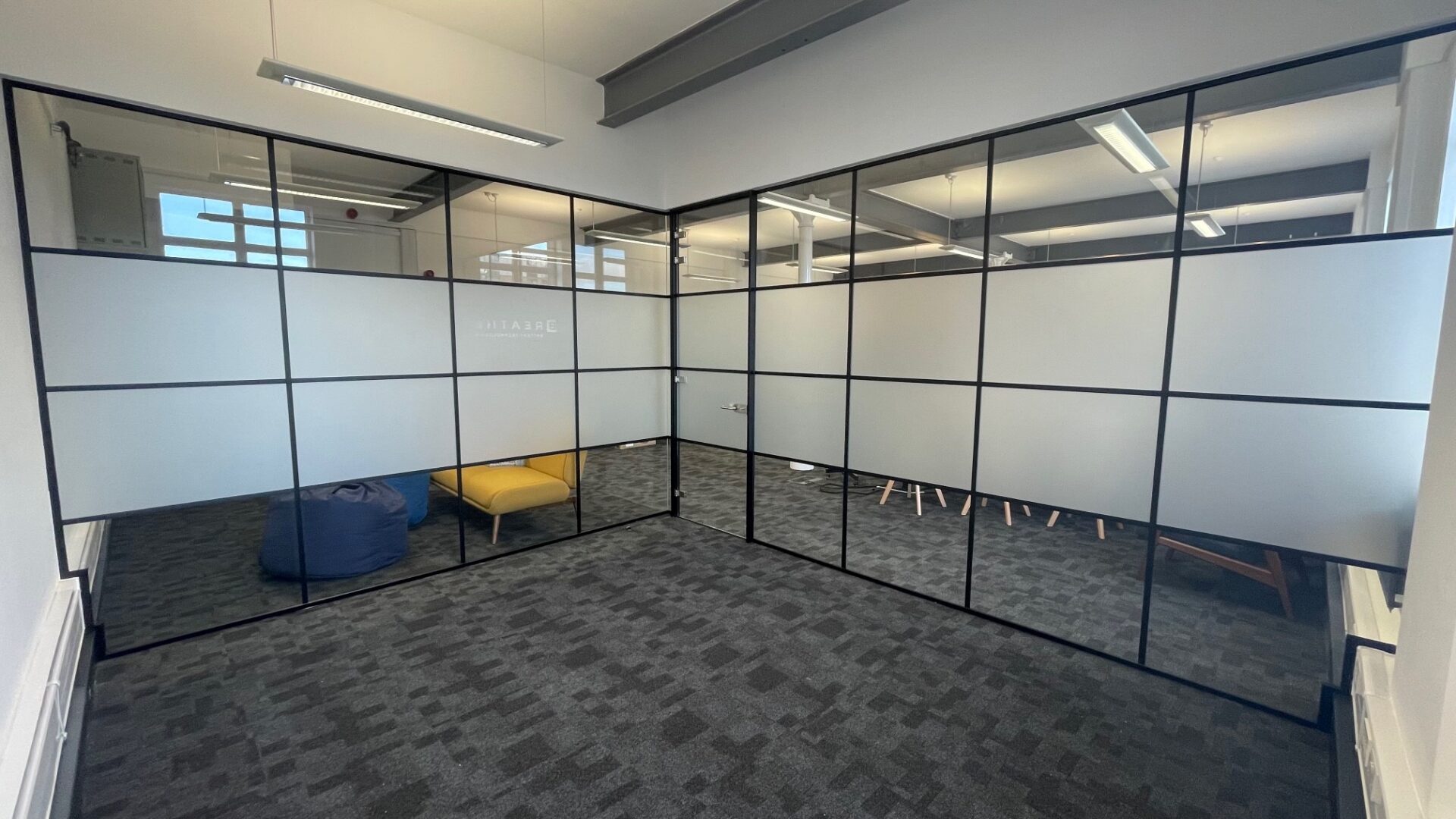
What is Frosted Glass?
Frosted glass is a type of glass that has been specially treated to make its surface translucent rather than fully clear. This is usually achieved through acid etching or sandblasting. These treatments roughen or dissolve the surface, which scatters light as it passes through.
This results in a panel that lets natural light flow into a space while obscuring visibility, so objects and people on the other side appear blurred. Unlike clear glass, which allows full visibility, or solid walls, which block out light entirely, frosted glass provides a balance, offering privacy without sacrificing brightness. Because of this, it is widely used in bathroom windows, shower enclosures, glass doors, offices, coworking hubs, leisure spaces, healthcare facilities, retail stores, hotels, and other commercial or residential spaces.
In this article, you’ll discover how frosted glass is made, the most common ways it is used in commercial interiors, the benefits it offers, how it compares with frosted film, and the maintenance it requires.
How is Frosted Glass Made?
There are two main methods used in production:
1. Acid Etching
A chemical solution lightly dissolves the glass surface. This creates a smooth, cloudy finish that diffuses light evenly. Acid etching covers the whole pane or creates decorative patterns.
2. Sandblasting
Instead of chemicals, this method uses high-pressure air mixed with grit or sand to roughen the surface. This process creates a textured, frosted effect that offers different levels of opacity and allows custom patterns or branding.
Both processes permanently alter the glass surface, making the frosted finish not peel, fade, or wash away. For commercial use, these treatments are usually applied to tempered or laminated glass to meet safety standards, ensuring the panels are strong enough for busy environments like offices, hotels, and retail spaces.
Why Do Commercial Spaces Prefer Frosted Glass?
Frosted glass is versatile, which is why it’s widely used in so many sectors. Here are some of the most common applications:
1. Offices and Meeting Rooms
Businesses use frosted glass partitions and doors to create private zones without shutting out natural light. It’s especially popular in boardrooms, HR offices, and executive areas where confidentiality is key. Consider pairing frosted glass with office glass partitions for a modern, professional layout.
2. Healthcare Facilities
Hospitals, dental practices, and clinics rely on frosted glass to maintain patient privacy in consultation rooms, treatment areas, and staff offices, while ensuring spaces remain bright and welcoming.
3. Retail Stores & Showrooms
Frosted glass can be customised with logos, graphics, or patterns, making it ideal for branded shopfronts, product displays, and fitting rooms. It creates a stylish backdrop that enhances the customer experience.
4. Hotels & Restaurants
In hospitality, frosted glass provides a sense of luxury and intimacy. It can be used to divide dining areas, create semi-private booths, or add elegance to hotel lobbies, spas, and leisure zones.
5. Gyms & Leisure Spaces
Gyms and studios often use frosted glass to separate workout zones or treatment rooms while maintaining an open, light-filled environment.
Key Benefits of Frosted Glass in Commercial Settings
1. Privacy without sacrificing light: Frosted glass offers an ideal balance for offices and client-facing spaces. It allows natural light to filter through, preventing rooms from feeling closed off, while still providing visual privacy for confidential meetings, medical consultations, or focused work areas.
2. Branding opportunities: Etched or printed frosted designs can incorporate company logos, patterns, or signage directly into the glass. This transforms partitions into branding tools, reinforcing corporate identity while also serving as functional dividers. It’s particularly effective in reception areas, conference rooms, and showrooms.
3. Professional aesthetic: Frosted glass partitions instantly elevate the look of a workplace, projecting a clean, contemporary image. Whether in retail, leisure, or hospitality environments, they communicate professionalism and attention to detail, leaving a strong first impression on clients and visitors.
4. Durability: Manufactured using tempered or laminated safety glass, frosted partitions are highly durable. They can withstand heavy daily use in busy offices or public-facing spaces without losing their finish, making them a long-term solution for high-traffic areas.
5. Low maintenance: Unlike clear glass, which often shows fingerprints, streaks, and smudges, frosted glass naturally conceals marks, reducing the need for constant cleaning. Routine wiping with standard glass cleaners is usually enough to maintain its appearance, making it a practical choice for busy environments.
6. Improved acoustics: When combined with double glazing, frosted glass can help reduce sound transmission between rooms. This creates a quieter, more productive environment, particularly important in busy environments where speech privacy is essential.
Common Frosted Glass Applications in Commercial Interiors
1. Glass Partitions: Large panels of glass treated with acid etching or sandblasting to create a translucent finish. They create flexible layouts in offices, coworking spaces, and classrooms.
2. Glass Doors: Made from frosted tempered or laminated glass and are available in sliding or hinged options. The frosted treatment can cover the entire door or feature decorative sections, ideal for boardrooms, hotels, and restaurants.
3. Glass Windows & Panels: Standard glass windows or wall panels treated with frosting to obscure visibility. Commonly used in retail shopfronts, dressing rooms, and healthcare facilities.
4. Custom Branding Glass: Glass surfaces treated with frosting techniques that incorporate company logos, patterns, or signage to strengthen brand identity. This turns partitions or doors into functional design features, often applied through precision sandblasting or acid etching to ensure the branding is permanent and resistant to wear.
Explore: Frosted Glass Partitions
Comparing the Types of Frosted Glass
Frosted glass comes in different types, each with its own advantages and limitations. Here’s a clear breakdown of the pros and cons for each option:
| Type | Pros | Cons |
|---|---|---|
| Sandblasted Frosted Glass |
|
|
| Acid-Etched Frosted Glass |
|
|
| Frosted Film |
|
|
If your project is a long-term commercial fit-out, frosted glass is usually the best option. For temporary solutions or rented spaces, frosted film may be more practical.
Maintenance & Care Tips for Commercial Frosted Glass
Frosted glass is easy to look after, but it does require the right cleaning methods to keep its surface clear and even:
1. Use a soft, lint-free cloth for wiping down the surface.
2. Apply mild, non-abrasive cleaners instead of harsh chemicals that could damage the etched finish.
3. Avoid scrubbing with rough sponges or pads as they can scratch the surface.
4. Rinse and dry thoroughly to prevent streaks or water spots.
5. Regularly check surrounding frames and fittings to ensure stability and safety.
Should You Choose Frosted Glass or Alternatives?
Frosted Glass
A long-term solution ideal for permanent, high-end commercial projects such as offices, hotels, and healthcare facilities. Because the finish is built into the glass itself (through etching or sandblasting), it won’t peel or fade, making it a durable option for environments with heavy daily use. It’s perfect when both privacy and a professional aesthetic are essential.
Frosted Film
A flexible alternative suited for temporary branding or evolving workspaces, such as rented offices or retail pop-ups. Since the film is applied onto clear glass, it can be removed or replaced as layouts, tenants, or branding needs change. It’s also cost-effective for businesses wanting a non-permanent privacy or design solution.
Final Thoughts
Frosted glass delivers privacy, elegance, and functionality across a wide range of commercial environments. Whether you’re planning a new office layout, a retail refurbishment, or a hotel fit out, frosted glass can be tailored to fit your brand and operational needs.
FAQs
Yes. Frosted glass can be etched or sandblasted with custom logos, patterns, or graphics to enhance branding.
Absolutely. When tempered or laminated, it’s strong enough for busy offices, retail stores, and public spaces.
On its own, frosted glass reduces visibility more than sound. However, when paired with double-glazed partitions, it can improve acoustic performance.
Etched glass uses sandblasting for a textured look, while acid-etched glass provides a smoother, more consistent finish. Both are durable and widely used in commercial interiors.
Yes, in many cases frosted glass panels can replace clear ones, or frosted film can be applied to achieve a similar effect.













